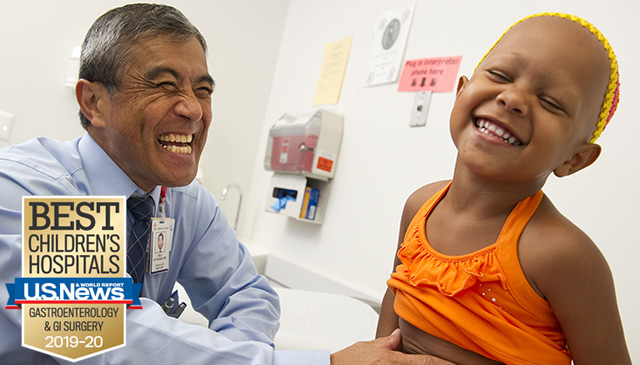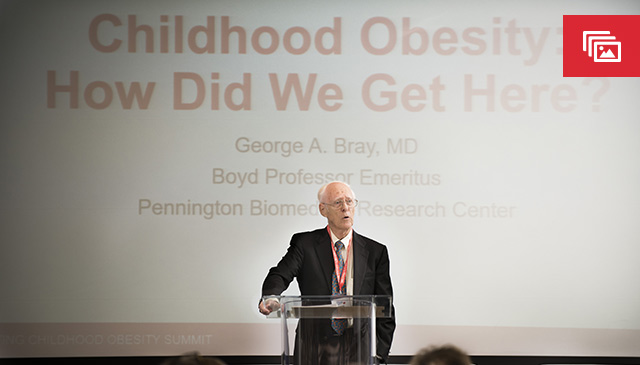
Texas Children’s Hospital recently celebrated a well-deserved milestone after being named No. 2 in the nation for Gastroenterology and GI surgery by U.S. News & World Report.
“Our team was delighted by this year’s ranking of No. 2 nationally,” said Dr. Benjamin Shneider, Chief of Gastroenterology, Hepatology and Nutrition. “I am particularly proud of the achievements our team has made in improving outcomes for the children and families who entrust us with their care.”
The U.S. News rankings uses a methodology that weighs a combination of factors including patient outcomes, quality of health, available clinical resources like specialized clinics and external accreditations, and compliance with best practices. Improved rankings show a health care organization’s commitment to providing high-quality care and identifying gaps where improvements are needed.
Big wins for patients and families
Building on the successes of previously existing programs, the Gastroenterology, Hepatology and Nutrition team, in collaboration with Pediatric Surgery and Liver Transplantation, continues to make great strides in patient care and outcomes which were recently noted in the U.S. News rankings:
- Achieved successful Kasai procedures in infants with biliary atresia. The most common reason for pediatric liver transplantation is biliary atresia (BA), which occurs in infancy. Within weeks, the liver suffers from extensive scarring that eventually leads to end-stage liver disease. One way to slow disease progression is with an operation called the Kasai procedure. Kasai procedures performed earlier have the best chances of delaying or preventing the need for a liver transplant.
In the U.S. News rankings, Texas Children’s scored the highest score for success after the Kasai operation. The score reflects the world-class care given to patients with biliary atresia cared for at Texas Children’s Hospital. Texas Children’s provides comprehensive care to infants with BA and their families, including aggressive nutritional support, social work services, nursing expertise, and attention by leading pediatric surgeons, hepatologists and transplant surgeons.
BA research at Texas Children’s Hospital, led by Dr. Sanjiv Harpavat, is laying the foundation for a uniform way to detect infants with biliary atresia earlier, to ensure they receive the Kasai procedure at a young age. Texas Children’s researchers have developed a newborn screening tool, which they have implemented in nurseries around the city. This has led to earlier referrals and helped fuel the improved outcomes with the Kasai procedure. Texas Children’s researchers are now working to implement this early screening program across Texas and nationwide, to ensure that all infants with biliary atresia can receive an early Kasai procedure, delaying liver transplantation and potentially avoiding the need for liver transplantation.
- Improved three-year survival for children undergoing liver transplantation. Texas Children’s has one of the largest and most successful pediatric liver transplant programs in the country. “Our team’s multi-disciplinary approach to pre and post-transplant care, further development of our Liver ICU, surgical innovations, and the incredible teamwork and dedication of our entire liver transplant teams, including our inpatient and outpatient nursing and support staff, have only enhanced our outcomes year after year,” said Dr. Daniel Leung, Director of Hepatology and Liver Transplant Medicine. Texas Children’s three-year liver transplant survival exceeds 92 percent and post-liver transplant length of stay is four days shorter than other high volume peer programs. Additionally, our one-year liver transplant survival exceeds 95 percent.
- Improved prednisone-free remission rates in children with Inflammatory Bowel Disease (IBD). Since steroids carry significant side effects for children, steroid-free remission is a commonly used outcome measure of clinical care quality in Inflammatory Bowel Disease. To meet this metric, an automated mechanism was implemented in the electronic medical record (EMR) system, which alerts physicians about their patients’ steroid use, thereby focusing attention on the on-going need and appropriateness of steroid use for each patient in a real-time fashion. As part of a hospital supported effort, Texas Children’s also is part of the International Improve Care Now (ICN) registry of pediatric IBD patients, which allows GI physicians to closely monitor the hospital’s active patient cohort and improve their clinical care. Steroid free remission indicates optimal medical management and decreased potential for IBD-related complications in children suffering from these disorders. It is a big win towards improved quality of life for our patients.
- Implemented successful community support groups
Our community hospital system at Texas Children’s has provided tremendous support to engage our children and families contending with IBD in the form of monthly Family Support Group meetings. These meetings create an outstanding venue for patient and family education, and enables parents to actively influence the care of their child. These interactions have helped to improve patient satisfaction and quality of life in children with IBD. Texas Children’s offers similar support programs for liver transplantation and intestinal failure.
Click here to learn more about our Gastroenterology, Hepatology and Nutrition Service at Texas Children’s Hospital.











